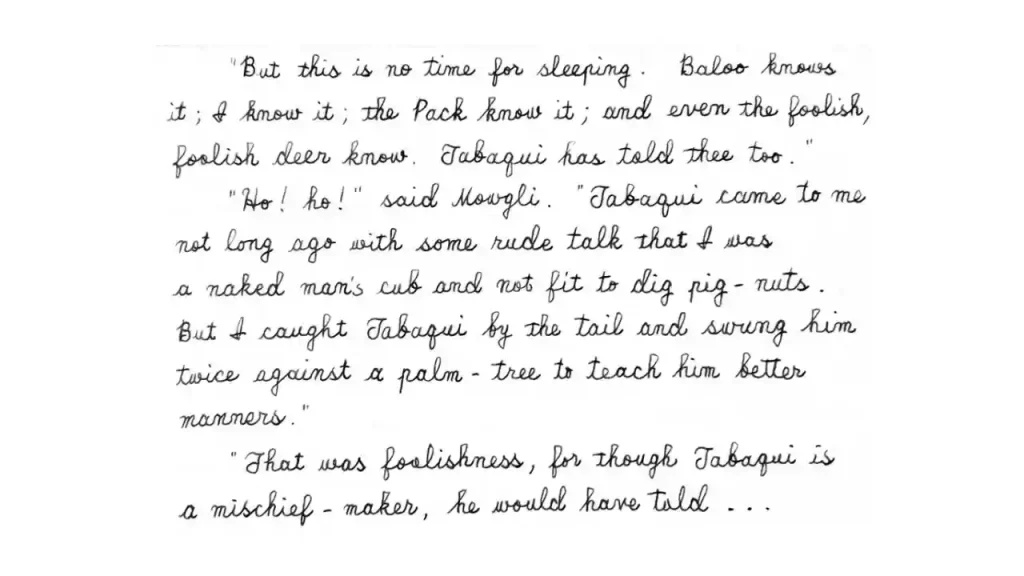“But this is no time for sleeping. Baloo knows it; I know it; the Pack know it; and even the foolish, foolish deer know. Tabaqui has told thee too.”
The Jungle Book
- Japanese grammar
- subject: みんな
- predicate: しっている
- modifier: シア・カーンのおもわくを
日本語訳:
「今は寝ている場合ではないぞ。バルーも、私も、群れも、シア・カーンが敵だと知っている。愚か者の鹿でさえ。お前もタバキから聞いているだろう」
“Ho! ho!” said Mowgli. “Tabaqui came to me not long ago with some rude talk that I was a naked man’s cub and not fit to dig pig-nuts.
- subject: タバキ
- predicate: わたしに・いう
- modifier: しつれいなことを
「タバキが最近、失礼な話をもって私のところへやって来たんだ。私が裸の人間の子供で、クルミを取るのに向いてないって」モウグリが言いました。
- Kanji, Hiragana
- 失礼/Shitsurei(しつれい, rudeness, impoliteness, excuse me, discourtesy, indiscretion, blunder)
But I caught Tabaqui by the tail and swung him twice against a palm-tree to teach him better manners.”
- subject: わたし
- predicate: おしえる
- modifier: タバキに・れいぎを
「私はタバキの尻尾をつかんで、パームの木に2回叩きつけて、礼儀を教えてやったんだ」
- 礼儀/Reigi(れいぎ, manners, etiquette, courtesy, politeness)
“That was foolishness, for though Tabaqui is a mischief-maker, he would have told thee of something that concerned thee closely.
- subject: タバキ
- predicate: はなす
- modifier: じゅうようなことを
「馬鹿なことをしたな。タバキは意地悪な奴だが、彼はお前にとって重要な事を伝えてきたのだろう」
- 意地悪/Ijiiwaru(いじわる, mean, ill-natured, sadistic, unkind, bullying)
- 重要/Jūyō(じゅうよう, important, significant, essential, crucial)
Open those eyes, Little Brother. Shere Khan dare not kill thee in the jungle.
「目を開けろ、リトルブラザー。シア・カーンはジャングルでお前を狩る気はない」
But remember, Akela is very old, and soon the day comes when he cannot kill his buck, and then he will be leader no more.
- subject: アキーラ
- predicate: 老齢
「しかし、覚えておけ。アキーラは老齢だ。彼が獲物を狩れない日がすぐにやってくる。そしてその時、彼はそれ以上リーダーではいられない」
- 老齢/Rōrei(ろうれい, old age, advanced age)
Many of the wolves that looked thee over when thou wast brought to the Council first are old too, and the young wolves believe, as Shere Khan has taught them, that a man-cub has no place with the Pack. In a little time thou wilt be a man.”
- subject: わかいオオカミたち
- predicate: シア・カーンの・いいなり
「お前の群れへの加入を認めたオオカミたちの多くも同じく老齢だ。
そして若いオオカミたちは信じている。シア・カーンの言う通りに、群れに人間の子供は不要であると。
近いうちに、お前は大人になるだろう」
- 加入/Kanyū(かにゅう, joining, entry, admission, affiliation)
- 不要/Fuyō(ふよう, unnecessary, unneeded, not required)
- 言いなり/Iinari(いいなり, yielding, obedient, compliant, at someone’s beck and call)
Reference : The Jungle Book by Rudyard Kipling (project gutenberg)
English Story With Easy Japanese Translation
